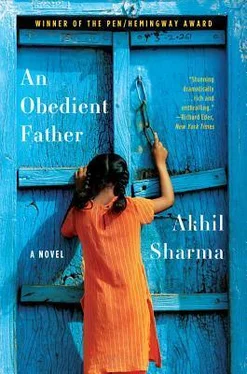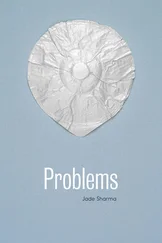"Rajesh Khanna is divorced and his wife sleeps with Sunny Deol. A man like that is not a man. No one will vote for someone like that." Mr. Gupta spoke casually, offering me the details as if he were handing me photographs of places where he had traveled.
"I thought you were smart." I had never before spoken this insultingly to him.
Mr. Gupta raised his hands off the arms of the chair and brought them down. "If the BJP is going to win the cities, even Rajesh Khanna can lose. Besides, I have money." After a moment he said, "Go to Mr. Maurya. Tell him the BJP has asked me to run for Parliament. He must know what the parties are planning to spend." I remembered taunting Mr. Maurya at Mr. Gupta's party. When I did not stand, Mr. Gupta said, "Think about me being in Parliament and you being rich. That will make you feel better."
"It doesn't."
The alley Mr. Maurya lives in is perhaps five feet wide, with a narrow half-meter-deep ditch running along one side. Chickens were wandering about and many of the doors to the
houses were open for air. I passed one door, which led into a dark windowless room where an old woman sat on a cot stringing firecrackers. Several years ago Mr. Maurya moved out of Old Delhi to one of the posh colonies, but his wife had found it too lonesome there and forced him to return.
Beside Mr. Maurya's door was a metal plaque that had maurya ENTERPRISES etched on it in Hindi, Gujarati, and English. This was the only distinguishing mark on the gray concrete wall behind which he lived. I rang the doorbell. I wondered if Mr. Gupta would be angry at me for how I had acted at the party. A young girl let me in.
The wall facing the alley goes up three stories and has windows with curtains that make it look like the face of an ordinary house. Then I stepped through the wall into a wide courtyard that was open to the sun. The house itself was two stories and painted a pale yellow. It had a broad veranda with large potted money plants. Five or six men were sitting on the veranda reading newspapers and drinking tea. The girl led me to them and I sat at their edge.
Some of the men appeared to know one another and were talking. The others kept to themselves. Tea arrived for me. As I sipped it, I realized that even in the short time since I had left the office, the clear precise fear Mr. Gupta had created had become muddled with the confused unhappy terrors that had been with me for days. I was like a man in the Arctic who is dying of cold and feels any increase in wind only momentarily. I wanted the responsibility of feeling out Mr. Maurya removed from me. I thought of putting my tea on the ground, standing, casually taking off all my clothes, and then sitting down to finish the cup. I smiled at the idea that Mr. Gupta had trusted an almost insane person with an important mission to a gangster. I sang God Hanumanji's song silently.
Occasionally a man came out and one of the men sitting with me followed him into the house. I saw one of Mr. Maurya's sons and waved to him, and he nodded back. Everyone appeared so serious that I wanted to shout, "This is nothing to laugh at."
About forty minutes after I arrived, the man came for me. The rooms close to the veranda were given over to business and every-
body in them was typing or working through files. Mr. Maurya could not tolerate laziness. When I was last here, several years ago, it was the middle of a particularly slow afternoon. That time, as I talked to Mr. Maurya, we walked through his offices so he could oversee his employees scrubbing the house clean.
I followed my guide up a white staircase onto the roof I asked God that Mr. Maurya give me news with which to discourage Mr. Gupta. If Mr. Gupta ran, Congress would want revenge.
The roof had an unpainted brick wall eight or ten feet high running along all sides except the one overlooking the courtyard. As soon as I stepped onto the roof, I began sweating heavily and had to squint.
"Hello, Mr. Karan," Mr. Maurya called out. "Still drunk?" He was sitting on a straw mat against the wall. Above him was an awning made of wire and covered with a printed bedsheet. Mr. Maurya wore only a white kurta and underwear, and his left leg was in a cast which went above his knee.
"What happened, sir?" My guide left as I walked to Mr. Maurya.
"The day Rajiv Gandhi died I rode all over Delhi on my motorcycle to see if everything was fine with my properties. In the evening, when I returned, there was some oil on the ground." Mr. Maurya skimmed his hand through the air to show his motorcycle slipping. He smiled. I stood before him till he patted the mat. Then I sat down at the foot of his unbroken leg. The thinness of his legs surprised me, because he had a large stomach. "So I'm giving my bones sun. I was carrying a gun, and when I fell, the gun went sliding. Some boy, some ten-year-old, grabbed it and ran." Mr. Maurya picked up a bottle of coconut oil that was sitting on top of an iron icebox beside him and passed it to me. "Oil my leg," he said, glancing toward his good one. My chuckling began again at being ordered to do this embarrassing job.
Mr. Maurya closed his eyes and tilted his head back. When I first met him, Mr. Maurya had laughed so easily and so hard his eyes would tear. Because my stomach was so large, I had to get on my
knees to oil his legs. I said, "The BJP came to Mr. Gupta and asked him to run for Parliament."
Mr. Maurya did not respond for several minutes. My undershirt and shirt were sticking to me from sweat. In the middle of the silence, he tapped his left thigh and I stood, switched to that side, and began kneading and oiling it. His underwear was bunched, letting me see part of a testicle. I imagined grabbing his crotch. I wanted to hear him yelp.
"Is this the Advani seat?" he asked.
"Yes." I was not surprised at his knowledge. Again Mr. Maurya was quiet. Then he opened the icebox, took out a Campa Cola, and, without offering me one, started sipping. This must also be part of my punishment, I thought.
"Did you know Mr. Gupta's father was in the Indian Administrative Service?"
"No." I was amazed. IAS officers were as rare as lottery winners.
"He was almost a Secretary."
Mr. Gupta had achieved so much, grabbing control of all the education department's money-raising, that I had never imagined he could be a failure relative to his own family. Mr. Gupta's vast connections now made sense.
"He died three, four years ago." Mr. Maurya closed his eyes once more and spoke slowly, thoughtfully. "Mr. Gupta applied but did not get into the IAS. His older brother did but didn't like it and is now the president of British Petroleum-Egypt." Since there was no reason for Mr. Maurya to be giving out free information, I realized he must have some purpose for telling me this. My sense of Mr. Gupta began to shift. "Mr. Gupta is smart, but not too smart. He thinks that because his father and his brother have been part of the world of the great, the worst will not be done to him." Mr. Maurya opened his eyes suddenly, as if to surprise me. I wondered if the people who worked for him were impressed by these mannerisms. "Maybe he's right, but after Rajiv Gandhi nobody can feel confident."
Mr. Maurya adjusted his position and wiped his face with a towel.
"Did the BJP offer him the spot definitely, or do they want to know how much money he can bring?"
I then understood that Mr. Maurya had begun negotiating the price for helping Mr. Gupta. "It was a definite offer," I said, though I did not know.
"If Sonia Gandhi runs he has to spend two hundred, three hundred lakhs. Otherwise, maybe one hundred." The amounts were so enormous I could not imagine them. I started smiling. "You don't want him to run?" Mr. Maurya asked.
"The BJP is very strong," I said, trying to hide my feelings behind words.
Читать дальше












